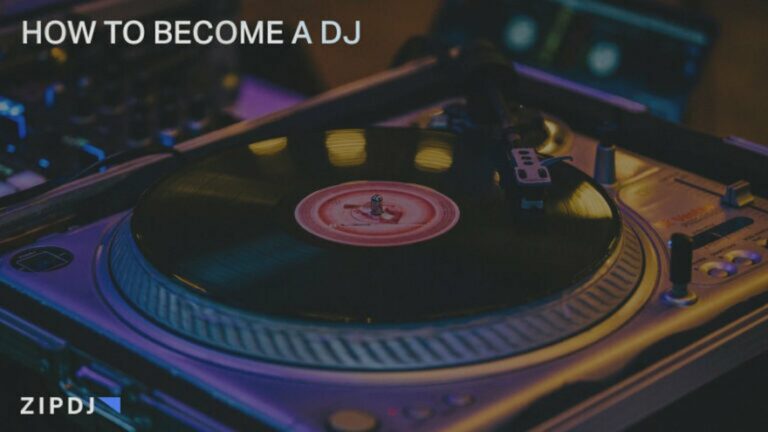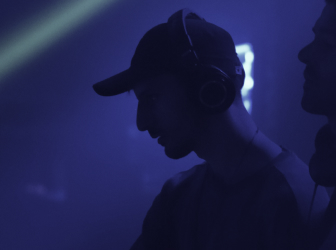How To Become A Club DJ: The Ultimate Step-By-Step Guide

Becoming a club DJ requires mastering the necessary equipment and networking with clients while building a killer library of music from your genre of choice.
It also means delving into the world of marketing and promotion, building a strong brand both online and offline where fans can listen to your mixes and follow your progress.
Continue reading for a complete overview of everything you need to know to become a successful DJ in clubs, from building a music collection to reaching out to booking agents.

What Does A Club DJ Do?
A club DJ is known for playing DJ sets at musical venues and parties, primarily in nightclubs, bars, or music festivals.
Using a combination of DJ controllers and other peripherals, club DJs typically play electronic music genres in a continual stream by mixing the tracks together.
In addition to performing sets, a club DJ must liaise with venue booking agents to book additional gigs while also building a following of fans on social media and offline.
Club DJ Equipment List
While most club venues will have in-house equipment for you to use, you’ll still need a complete setup for planning and practicing mixes from your home.
Some venues may require you to bring DJ gear to the venue, for instance, if you’re not playing in the main room and instead using a temporary location.
Here’s a run-down of the core equipment you’ll have to invest in if you want to become a professional club DJ:
1. DJ Controllers
One of the most fundamental items of equipment a DJ needs is a DJ controller, through which they can introduce new tracks into the mix during their sets.
Some of the best DJ controllers come with an integrated mixer, sometimes called a “standalone DJ controller,” which includes all the features needed to mix.
Pioneer CDJs are also popular for DJing, allowing the DJ to use downloaded music files in their sets through the integrated USB ports.
2. Turntables & Mixer
A more traditional approach to club DJing is through turntables and a mixer, the dominant method for mixing tracks for many decades.
If you’re learning how to DJ with vinyl, you’ll need to invest in two direct-drive turntables and a separate mixer for transitions and effects.
While many modern DJs prefer to use a controller, turntables allow you to expand your options when buying music, as well as perform DJ tricks such as scratching.
3. Speakers
While club venues will have their own sound system ready for you to use at your gigs, you’ll still need to buy a pair of speakers for when you practice at home.
You can pick up a pair of budget monitor speakers second-hand for a reasonable price, and owning your own speakers allows you to expand your DJing style.
For example, if you’re asked to play a set for an after-club house party, a pair of speakers is an essential item in your repertoire of gear.
4. DJ Software
As DJ technology continues to evolve, so do the features and tools offered by DJ software improve and expand the options DJs have when performing sets.
Professional DJs use different software, with programs such as Recordbox, Serato, and Traktor all popular in bars and nightclubs worldwide.
Before you decide which software to use, research what it’s capable of and choose the one with the features that match your budget.
5. Accessories
Lastly, you’ll need to pick up some DJing accessories to go with your hardware and software, the most important of which is DJ headphones.
It’s important to get the best possible quality headphones you can afford, as you’ll use these when cueing and mixing and listening intently for changes in the sound.
You should also pick up a set of spare cables, and if you’re playing vinyl records, you’ll need a record bag to carry them to and from the venue.
How To Become A Club DJ (Step-By-Step)
Learning how to become a club DJ requires a combination of knowledge about the technical skills needed to mix well and a comprehensive selection of excellent tracks.
We’ve covered these and more important areas of consideration in this guide to help you pick up more gigs and build a strong brand and reputation.
So, with that said, here’s everything you need to know to become a club DJ:
Step 1: Define Your Genres & Style
The genre and style of music you choose will significantly impact the venues you play at and where you get your tracks from.
Whether you’re playing drum and bass or hip-hop, you should clearly define your particular niche and use this to inform your marketing and branding.
When starting, you should set a specific goal and use this to build an action plan, for example, compiling a list of relevant venues in a spreadsheet.
As you become more experienced, you can consider introducing new styles to your DJ mix and expanding the list of clubs where you can play.
Step 2: Master Your DJ Equipment
A club DJ needs to know their DJ equipment like the back of their hand so they can showcase a range of technical skills and get the dance floor pumping.
If you’re not competent with your gear, you’re more likely to make mistakes, and the club or bar manager won’t ask you back for another gig.
You can sign up for courses online at places like Club Ready DJ School, which will run through the mixing skills needed when playing sets in clubs.
Step 3: Build Your Brand
Building a strong brand is a crucial aspect of promoting your music and involves designing an eye-catching logo you can use across your social media presence.
You can create your own logo and branding designs, or if you have professional designer friends, ask them to help you put something together.
Once you’ve created a brand style, use the logos across your online presence, for instance, on your Facebook business page and other social media channels.
You can also use your logo and branding for physical promotions, adding them to a business card or on a banner to hang in front of the DJ booth at a gig.
Step 4: Reach Out To Booking Agents
Once you’ve designed your branding and logo, it’s time to reach out to booking agents and venue managers to try and get a spot at one of their events.
The best way to do this is to assemble a professional DJ press kit with links to your online mixes, DJ website, and social media pages.
Include any previous experience you have playing club gigs, as well as any high-resolution photographs and videos of your prior events.
A DJ press kit is essential for successful self-promotion, so take the time to refine its content so it represents what you have to offer in the best possible way.
Step 5: Build Your Online Presence
Most club DJs today rely on their online presence to connect with and build their fan base, and this should be a priority when promoting your services.
Research the various ways the best DJ websites present their information and use branding across each page for a consistently pleasing aesthetic.
You’ll also need to set up social media pages such as TikTok and Instagram and a business page on Facebook to share upcoming parties and events.
It’s important that you engage with people who comment and interact with your posts, as this will foster a sense of community and bring you closer to your fans.

Step 6: Host A Party
If you’re struggling to land your first club gig, hosting a party in your local area is an excellent way to build connections and establish a reputation.
If you’re still at school or college, see if there are any birthday parties coming up and offer to play a DJ set for free.
You can also hire a venue yourself and host a party here, covering the costs by charging a small entrance fee.
Record your DJ set and share it on YouTube, MixCloud, or another online hosting platform, and use this as part of your professional promotional materials.
Step 7: Collaborate With Other DJs
As with hosting your own parties, collaborating with DJs in your area is an excellent method for building a strong network of like-minded music fans.
In fact, if you know DJs in your area who are also looking to reach a larger audience, you can work together to put on parties, sharing costs and attracting more guests.
Some of the most famous DJs in the world frequently perform together at nightclubs and festivals to use their combined clout to increase ticket sales.
It’s a tried and tested strategy for creating successful events, and you don’t need to be a big-name artist for the general principles of collaboration to apply.
Step 8: Record & Share Mixes
Recording your mixes is an essential part of the process of improving your skill level and mastering the tracks you have in your archive of tracks.
By reviewing previous mixes, you can learn to spot basic mistakes, improve your technical prowess, and deliver much smoother transitions.
Sharing these mixes online and with friends and getting their feedback will also help you refine your track selection and iron out any flaws in your mixing.
They can also be used as part of your marketing drives and self-promotion initiatives, particularly if they’re accompanied by video footage showing a packed dance floor.
Step 9: Network At Gigs
There are many different ways you can get DJ gigs, but relatively few you can do without having to spend money on advertising and other promotions.
If you’ve already picked up a few gigs, using these events to network is a great way to increase your exposure without breaking the bank.
Networking is also a great way to land yourself a resident DJ slot as you foster relationships with booking agents and venue managers.
You can also hook up with other DJs, arrange to host parties, and get your friends to strengthen your overall network as they interact with other customers.
Step 10: Develop New DJ Skills
Once you’ve mastered the basic techniques required for DJing, it’s time to develop new and advanced DJ skills to take your sets to the next level.
Gain staging, infinite loop mixing, and multi-deck DJ sets are just a few of the advanced skills you can develop as you gain more DJing experience.
You can also consider venturing into music production and playing your own compositions and remixes as part of your next DJ set.
Using additional hardware such as drum machines and synthesizers can also bring an extra flourish to your sets and help you to stand out from the competition.
If you’re struggling to master these advanced techniques, plenty of online courses are available, as well as detailed YouTube tutorials you can watch for free.
Summary
So there you have it: everything you need to know to become a competitive club DJ and showcase your musical taste while improving your skill level over time.
Whether you’re playing techno or drum and bass, the basic principles of club DJing remain the same, and the more you network, the broader your opportunities will become.
You can complement the tips we’ve offered here by taking action and signing up for online courses, where experts are ready to help you become a great DJ.
Start building a great music collection with a ZIPDJ subscription and access the hottest new releases and remixes.
Not a member ?
Join Today for Unlimited Music Downloads. Visit zipdj.com for more information.



